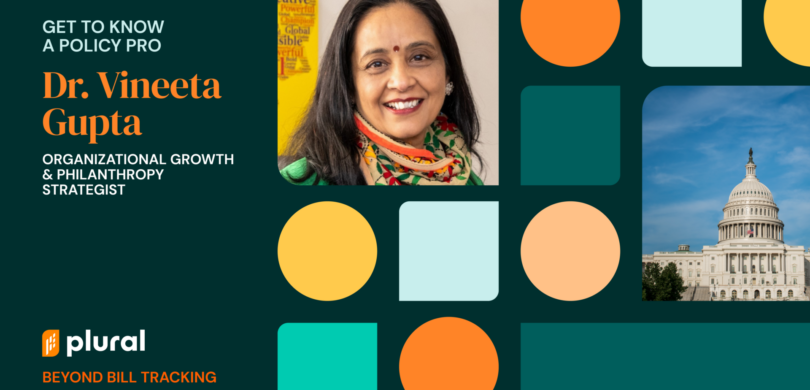In this series, you’ll learn about the career paths of impactful public policy shapers and champions.
Dr. Vineeta Gupta, Organizational Growth & Philanthropy Strategist | Systems Change Leader
Human rights advocacy is about shifting power, holding systems accountable, and building a society where dignity, equity, and freedom, and justice are ensured irrespective of race, gender, ethnicity, immigration status, or zip code.
— Dr. Gupta
Plural: How did you get started in advocacy, and what drew you to this field?
Gupta: In many ways, advocacy chose me. I come from four generations of social justice advocates, and I am honored to carry forward that legacy in my own way. My first experience with advocacy came at age 7 in India when I successfully advocated to change the visiting hours for my mother, a political detainee.
Social justice to me means dismantling systemic barriers, ensuring equitable access to resources, supporting communities in shaping their own futures, and challenging oppressive structures at every level. Advocacy became the thread that tied my work together, from rural clinics, community mobilization, to global policy rooms. What drew me to this field was a strong belief that human rights, dignity and equal opportunities are not exceptions, but expectations.
Plural: What are the primary goals and responsibilities of a human rights advocate? What kind of organizations do you work with?
Gupta: Human rights advocacy is about shifting power, holding systems accountable, and building a society where dignity, equity, and freedom, and justice are ensured irrespective of race, gender, ethnicity, immigration status, or zip code. We must aspire to listen deeply, speak fearlessly, act strategically and ground our work in facts and lived experience.
Throughout my career, I have contributed to a wide range of organizations, both as a volunteer and as a staff member. I served for about 16 years on the National Council, the small governing body of the People’s Union for Civil Liberties (PUCL), one of India’s leading human rights organizations. Since then, whether strengthening public health systems, advancing women’s leadership, or shaping grantmaking strategies, my focus has stayed rooted in expanding rights, investing in community leadership, and building the foundations for lasting systemic change.
Plural: Can you walk me through a typical day in your role as a policy professional?
There’s no such thing as a truly typical day in a policy professional’s life—and that’s part of what makes the work dynamic. A day could start with the optimism of being close to a policy win, only for shifting political winds to undo years of relationship-building, advocacy, and momentum, sending efforts back to the drawing board. Some constants include calls with partners across time zones, reviewing policy documents, meetings with partners, strategy sessions, and working on funding proposals to advance the mission. It also involves staying current on political context, policy and community needs, best practices, and technology
Plural: How do you build and maintain relationships with lawmakers, community organizations and other stakeholders?
Gupta: In my view, authentic relationships are at the core of human happiness, no matter what profession we choose. In the policy world, they are not just important, they are essential. Relationships are built long before they are needed, strong enough to weather both wins and setbacks. I believe in intentionally nurturing a community circle of support, rooted in trust, empathy, and mutual respect. That includes showing up consistently, respecting people’s experiences, creating opportunities for collaborative success, and being willing to share strength and vulnerability. With lawmakers, it’s about understanding their constraints and priorities. With communities, it’s about supporting their voices. And with all stakeholders, it’s about building trust that sustains shared journeys beyond any one campaign.
Plural: What are some of the biggest challenges you face in your work, and how do you navigate them?
Gupta: The biggest challenges often come down to informal and formal power centers internally and externally, and how fiercely some forces will obstruct the change. Change work is often slow, and backlash is real. I’ve learned to navigate these challenges by staying anchored in values, being strategic about timing, nurturing a circle of community support, and building coalitions that can withstand pressure.
Creating a just world is a matter of continuum rather than an end goal, so success in advocacy, to me, is about continuing despite roadblocks and setbacks.
Plural: Can you describe a particularly successful campaign or project you’ve worked on? What factors contributed to its success?
Gupta: I have been very fortunate to have led many successful campaigns, from mobilizing rural communities to seek justice in crime against women, health policy change in many countries, and a multi-country campaign for global access to affordable medicines. Building impactful alliances with diverse stakeholders such as health activists, legal experts, student organizations, funding entities, elected officials, and grassroots organizers across continents has been the key. We rooted our strategy firmly in communities’ realities, stayed disciplined in our messaging, used creative communications and media advocacy effectively, and refused to let political or structural barriers drain our momentum. But most of all, we led with hope and resilience and that energy proved contagious.
Plural: What changes have you seen in the human rights sector over the course of your career, and how have you adapted to them?
Gupta: The sector has become much more intersectional — there’s a deeper understanding now that you can’t talk about health without talking about race, gender, or economic justice. It has also become more complex, with new technologies creating both unprecedented opportunities and new challenges in advocacy, communication, and mobilization.
At the same time, the rise of misinformation, disinformation, hyper-polarization, and the increasingly blurred lines between fact and fiction have made advocacy work even more challenging. The speed at which information is disseminated and consumed today demands constant vigilance, adaptability, and discernment. I have adapted by remaining an insatiable learner, staying open to being challenged, embracing emerging tools thoughtfully, and sharpening my approach to remain grounded.
Plural: What are some of the key skills that you believe have been crucial to your success as an advocate?
Gupta: While technical skills are the foundation, it is often soft skills such as authenticity, continuous learning, and emotional endurance that carry us across the finish line. Recognizing that those closest to the problem are the best positioned to lead the solution has been fundamental to my approach. The ability to bridge experiential knowledge with theoretical, conceptual, and tactical understanding is critical to crafting successful advocacy strategies.
Other skills that come in handy are listening with intent, communicating effectively across differences, analyzing complex problems and translating them into practical actions, and steady persistence. We as advocates often struggle with humility, resilience, and the ability to get back up after disappointments. Creating a just world is a matter of continuum rather than an end goal, so success in advocacy, to me, is about continuing despite roadblocks and setbacks.
Need help building your team’s AI policy strategy?
Reach out to us to schedule a consultation, get a downloadable copy of our AI policy guide, or see how we help clients lead with confidence in the age of artificial intelligence.
Plural’s AI-powered legislation tracker offers not just data, but foresight, providing real-time updates, predictive analytics, and strategic insights. No matter your needs, we have a plan for you.

